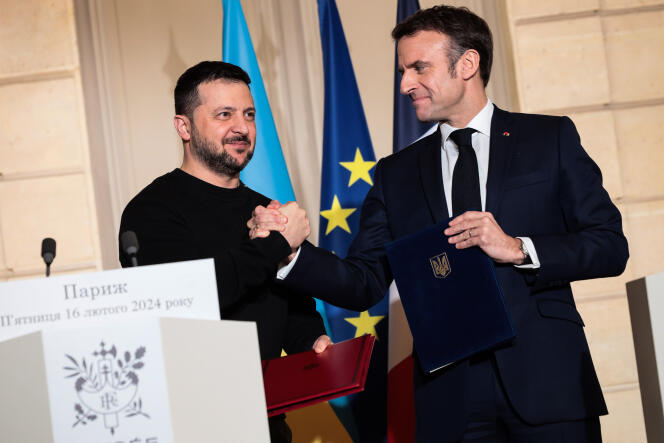


Emmanuel Macron was seated with a glass of whisky in hand. The night was wearing on in the portrait room at the Elysée Palace, on February 21. The president clinked his glass with those of his guests, responding to their congratulations on his "beautiful speech" in honor of the Armenian WWII-era resistance fighters Missak and Mélinée Manouchian, whom he had just inducted into the Panthéon. Yet the president was pensive. The situation in Ukraine, which has been under invasion by Russian troops for the past two years, was deteriorating. The war was getting bogged down. "In any case, in the coming year, I'm going to have to send guys to Odesa," said the president before a handful of guests.
Five days later, in the Elysée's reception room, Macron answered a question about the possibility of sending Western troops to Ukraine. The international conference on Ukraine, bringing together some twenty European leaders, had just come to a close. "No option should be discarded," replied the president, without hesitation.
The phrase provoked an international outcry. Germany refuted it, as did the United States. On the domestic political scene, opposition leaders went into uproar. "Emmanuel Macron is playing warlord, but it's our children's lives he's so carelessly talking about. It's peace or war in our country we're talking about," wrote far-right leader Marine Le Pen on X. "The era of nonsense," said Jean-Luc Mélenchon, the leader of La France Insoumise (LFI, radical left).
The controversy illustrated Macron's change of attitude towards Russia, switching from the side of foreign policy doves to that of the hawks over the months of war. How long ago it seems that in June 2022, Macron was suggesting to "not humiliate Russia"! The French president now claims to be one of Ukraine's staunchest allies, ready to provide Kyiv with "no-limit support" to ensure Moscow's defeat. He has made a complete U-turn. "Emmanuel Macron's comments are always ultra-consistent," said a source at the Elysée.
Macron had long believed that dialogue with Vladimir Putin was possible and useful. During his many phone calls with the Russian president, he had been careful to show – through a word slipped in here or there – that he was not fooled by Moscow's duplicitous games, explained a source who participated in these calls. Those who have met Putin know that the former KGB agent is a master in the art of deception. "The most striking thing about Putin is that he speaks with a very, very small voice," said a minister who has met the Russian president twice.
You have 76.77% of this article left to read. The rest is for subscribers only.
